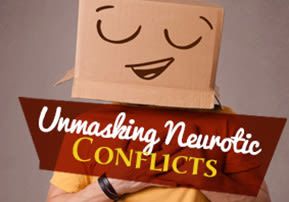
Unmasking Neurotic Conflicts
A woman who was spending too many hours a day in personal prayer sought help because she was not attending to the responsibilities of caring for her children...

Wherever a psychological problem exists, you can be sure that it is the outgrowth of an underlying conflict. Just as fever is a symptom of a physical problem and not the problem itself; problems such as anxiety, depression, detachment, or a need to dominate others are also only symptoms of a deeper problem. To detect the deeper problem, however, is no easy matter – partly because they are mostly unconscious, but even more because the neurotic goes to any length to deny their existence.
A woman who was spending too many hours a day in personal prayer sought help because she was not attending to the practical responsibilities of caring for her children and her home. On one hand she clung to the belief that she shouldn’t waste time on such mundane matters as shopping or bathing her children, after all Hashem can do anything; on the other hand, she recognized that her personal affairs and her children’s behavior were becoming increasingly unmanageable.
When she came to understand that her service to Hashem in prayer was not real but rather a way to dissociate herself from her responsibilities she was able to search for the deeper truth and meaning of her  problematic behavior.
problematic behavior.
As it turned out, when she was a child she lived in a hostile and menacing family environment where there was a lack of reliable warmth. She felt isolated and helpless in a hostile world. There she suffered from a number of adverse factors: her parents were dominating, indifferent, erratic, lacked respect for her needs, gave her no real guidance, disparaged her, forced her to take sides in parental disputes, kept her isolated from other children, made promises that they did not keep and much more. The net effect of this on her was that she developed a very deep and basic insecurity.
This basic insecurity was too painful for her to live with so she developed a strategy to rid herself of it. Her strategy was to detach herself from her parents by developing an elaborate fantasy life that enabled her to dissociate from her painful reality. Eventually this strategy became a part of her personality and her character. As her neurosis worsened, she spent increasingly more and more time in her isolated world of fantasy where she moved away from others in her mind whenever she felt insecure. When she discovered personal prayer, her problems became more acute due to her rationalization that since there is nothing better than prayer, she could exempt herself from the necessity of attending to her affairs by praying all day long.
A lack of emuna was not a factor in her developing her childhood insecurity or in the initial development of her strategies to combat it. She did not have a choice regarding the family situation that she was born into. G-d gave her that family situation as a test for her to pass later on, but G-d obviously does not expect young children to master an abusive environment with emuna. However, a lack of emuna was certainly at the heart of the maintenance of her the neurotic solutions later when she grew older enough for G-d to expected her to learn about emuna.
As an adult, it is only emuna that can enable her to untangle the web of conflicts that have become a part of her personality. She can only be helped by trusting in a process and a therapist that she doesn’t know will help her. Her emuna in a virtual stranger and a process that is unknown to her is what will help her. When she takes a leap of faith and trusts the therapist and the Torah that he represents she receives the help that she needs from Above.
Central to understanding and helping people with neurotic conflicts is the concept of free will. Everyone was created with the capacity for making their own decisions and choices in life. However, it is quite obvious that people with neurotic conflicts do not make decisions in the same way as people who are not neurotic make decisions. In fact the source of the neurotic’s conflict revolves around his having lost his capacity to decide anything wholeheartedly because his very wishes go in opposite directions. His capacity for free choice has been covered up, entangled and impaired by a complex network of conflicting husks. I learned from my Rabbis and from my subsequent clinical experience that it is entirely possible for the neurotic to regain full access to his innate power of choice. He will recover as long as he is willing to undergo the effort and hardship of untangling and resolving the parasitic husks which feed like a vampire on his life blood.
A young neurotic man is dependent and compliant in relation to his mother who dominates him. His intense need for affection compels him to obediently follow her advice. At times he is aware that he has his own thoughts that differ from his mother’s, but as soon as he begins to entertain his own thoughts, he is immediately thrown into conflict with his dependent neediness for his mother’s love and protection.
The difference between normal conflicts and neurotic conflicts is that normal conflicts are conscious while neurotic conflicts are either entirely unconscious or least one side of the conflict is unconscious. In his case, he was mostly aware of his need for his mother; but what was repressed and more hidden from him was his anger at his mother for dominating his life. As one would expect, when he became ready for marriage the conflict with his mother intensified. As he became more aware of his anger and resentment toward his mother he regained his ability to use his free will to decide to live in Israel rather than in the U.S. which is where his mother wanted him to be.
As I mentioned above, most “problems” are symptoms, a type of code that stands for and masks a deeper problem. To detect the deeper problem, requires faith because the person cannot see the problem or necessarily believe there is a problem at all. This is due to the problem being unconscious and hidden from him. He knows that something is holding him back in life but nothing more. It is only through the person’s faith in his therapist and the Torah Rabbi’s that he represents that he is willing to go through the arduous process of searching for the truth and making the spiritual correction that removes the parasitic husks. Once this is accomplished, he can enjoy the actualization of his own will and feel at one with his own values.











Tell us what you think!
Thank you for your comment!
It will be published after approval by the Editor.